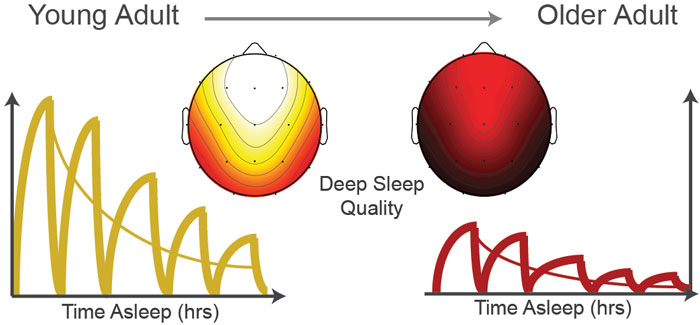Youthful, healthy slow waves and spindles help transfer memories and information from the hippocampus, which provides the brain's short-term storage, to the prefrontal cortex, which consolidates the information, acting as the brain’s long-term storage.
"Sadly, both these types of sleep brain waves diminish markedly as we grow old, and we are now discovering that this sleep decline is related to memory decline in later life," said Winer, a doctoral student in Walker's lab.
Another deficiency in later life is the inability to regulate neurochemicals that stabilize our sleep and help us transition from sleep to waking states. These neurochemicals include galanin, which promotes sleep, and orexin, which promotes wakefulness. A disruption to the sleep-wake rhythm commonly leaves older adults fatigued during the day but frustratingly restless at night, Mander said.
 Of course, not everyone is vulnerable to sleep changes in later life: "Just as some people age more successfully than others, some people sleep better than others as they get older, and that’s another line of research we’ll be exploring," Mander said.
Of course, not everyone is vulnerable to sleep changes in later life: "Just as some people age more successfully than others, some people sleep better than others as they get older, and that’s another line of research we’ll be exploring," Mander said.
Meanwhile, non-pharmaceutical interventions are being explored to boost the quality of sleep, such as electrical stimulation to amplify brain waves during sleep and acoustic tones that act like a metronome to slow brain rhythms. However, promoting alternatives to prescription and over-the-counter sleep aids is sure to be challenging.
"The American College of Physicians has acknowledged that sleeping pills should not be the first-line kneejerk response to sleep problems," Walker said. "Sleeping pills sedate the brain, rather than help it sleep naturally. We must find better treatments for restoring healthy sleep in older adults, and that is now one of our dedicated research missions."
Also important to consider in changing the culture of sleep is the question of quantity versus quality. "Previously, the conversation has focused on how many hours you need to sleep," Mander said. "However, you can sleep for a sufficient number of hours, but not obtain the right quality of sleep. We also need to appreciate the importance of sleep quality.
"Indeed, we need both quantity and quality," Walker said.
Pages: 1 · 2
More Articles
- National Institutes of Health: For Healthy Adults, Taking Multivitamins Daily is Not Associated With a Lower Risk of Death
- Medicare Advantage Increasingly Popular With Seniors — But Not Hospitals and Doctors
- Julia Sneden Redux: Age Rage; Sometimes You Just Have to Strike Back
- Medical Billing and Collections Among Older Americans
- Health, United States, 2020-2021: Annual Perspective; Focus of This Issue is On Health Disparities by Sex, Race, Ethnicity and Socioeconomic Status
- Shhhhhh by Ferida Wolff
- Women Consistently Earn Less Than Men; Women Are Over-represented in Lower Paying Jobs and, As They Age, the Pay Gap Widens Even More
- Rose Madeline Mula Writes: I’ve Got A Secret – NOT!
- On A Chilly Saturday, Winter Graduates Turn to Their Future: “Some of (your) most important lessons came from a real-life curriculum no one ever anticipated”
- Government of Canada Renews Investment in Largest Canadian Study on Aging







